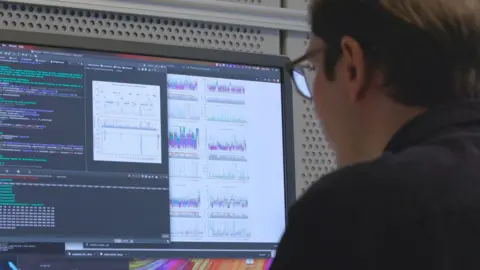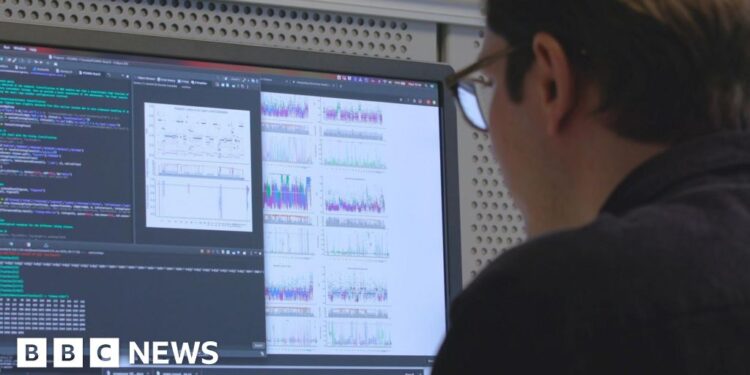James GallagherHealth and science correspondent
 Jeff Dowling/EMBL-EBI
Jeff Dowling/EMBL-EBIArtificial intelligence can predict people’s health problems over a decade into the future, say scientists.
The technology has learned to spot patterns in people’s medical records to calculate their risk of more than 1,000 diseases.
The researchers say it is like a weather forecast that anticipates a 70% chance of rain – but for human health.
Their vision is to use the AI model to spot high-risk patients to prevent disease and to help hospitals understand demand in their area, years ahead of time.
The model – called Delphi-2M – uses similar technology to well-known AI chatbots like ChatGPT.
AI chatbots are trained to understand patterns of language so they can predict the sequence of words in a sentence.
Delphi-2M has been trained to find patterns in anonymous medical records so it can predict what comes next and when.
It doesn’t predict exact dates, like a heart attack on October 1, but instead estimates the likelihood of 1,231 diseases.
“So, just like weather, where we could have a 70% chance of rain, we can do that for healthcare,” Prof Ewan Birney, the interim executive director of the European Molecular Biology Laboratory, told me.
“And we can do that not just for one disease, but all diseases at the same time – we’ve never been able to do that before. I’m excited,” he said.
 Jeff Dowling/EMBL-EBI
Jeff Dowling/EMBL-EBIThe AI model was initially developed using anonymous UK data – including hospital admissions, GP records and lifestyle habits such as smoking – collected from more than 400,000 people as part of the UK Biobank research project.
The model was then tested to see if its predictions stacked up using data from other Biobank participants, and then with 1.9 million people’s medical records in Denmark.
“It’s good, it’s really good in Denmark,” says Prof Birney.
“If our model says it’s a one-in-10 risk for the next year, it really does seem like it turns out to be one in 10.”
The model is best at predicting diseases like type 2 diabetes, heart attacks and sepsis that have a clear disease progression, rather than more random events like infections.
What can you do with the results?
People are already offered a cholesterol-lowering statin based on a calculation of their risk of a heart attack or stroke.
The AI tool is not ready for clinical use, but the plan is to use it in a similar way, to spot high-risk patients while there is an opportunity to intervene early and prevent disease.
This could include medicines or specific lifestyle advice – such as people likely to develop some liver disorders benefitting from cutting back their alcohol intake more than the general population.
The artificial intelligence could also help inform disease-screening programmes and analyse all the healthcare records in an area to anticipate demand – such as how many heart attacks a year there will be in Norwich in 2030, to help plan resources.
“This is the beginning of a new way to understand human health and disease progression,” said Prof Moritz Gerstung, head of the division of AI in oncology at DKFZ, the German Cancer Research Centre.
He added: “Generative models such as ours could one day help personalise care and anticipate healthcare needs at scale.”
The AI model, described in the scientific journal Nature, needs refining and testing before it is used clinically.
There are also potential biases as it was built from UK Biobank data which is drawn mostly from people aged 40 to 70, rather than the whole population.
The model is now being upgraded to account for more medical data such as imaging, genetics and blood analysis.
But Prof Birney says: “Just to stress, this is research – everything needs to be tested and well-regulated and thought about before it’s used, but the technology is here to make these kinds of predictions.”
He anticipates it will follow a similar path to the use of genomics in healthcare where it took a decade to go from scientists being confident in the technology to healthcare being able to use it routinely.
The study was a collaboration between the European Molecular Biology Laboratory, the German Cancer Research Centre (DKFZ) and the University of Copenhagen.
Prof Gustavo Sudre, a neuroimaging and AI researcher at King’s College London, commented: “This research looks to be a significant step towards scalable, interpretable, and – most importantly – ethically responsible form of predictive modelling in medicine.”
Source link : https://www.bbc.com/news/articles/cx2pj502ev6o?at_medium=RSS&at_campaign=rss
Author :
Publish date : 2025-09-17 15:19:00
Copyright for syndicated content belongs to the linked Source.








